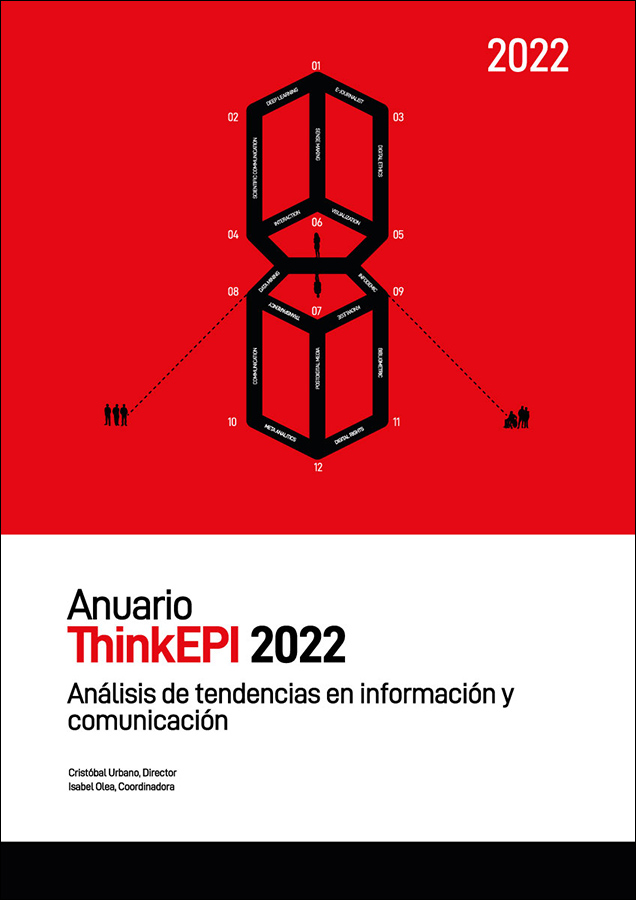Hacia las métricas de contexto: clasificación de citas en Web of Science
DOI:
https://doi.org/10.3145/thinkepi.2022.e16a32Palabras clave:
Teoría de la citación, Clasificación de citas, Web of Science, WoS, Evaluación de la investigaciónResumen
El objetivo de esta nota es describir la nueva funcionalidad de clasificación de citas por contexto proporcionada por Web of Science (WoS), en la que las citas recibidas por un trabajo se clasifican en cinco categorías (Background, Basis, Support, Differ, Discuss). Con el fin de testear las prestaciones de la funcionalidad se han llevado a cabo dos casos de estudio. Por un lado, una revista (Profesional de la información; 1,604 publicaciones) y, por otro lado, un autor (Loet Leydesdorff; 341 publicaciones). Ambos casos reflejan la todavía baja cobertura de citas clasificadas (inferior al 6%) que limitan el uso de esta funcionalidad actualmente. Finalmente se discuten algunos de los interrogantes que se abren con el uso de estas métricas de contexto, tales como la precisión, comprensión, simplificación, representatividad, comparabilidad, idioma, agregación, uso evaluativo, efectos y extrapolación.
Descargas
Citas
Bornmann, Lutz; Daniel, Hans-Dieter (2008). "What do citation counts measure? A review of studies on citing behavior". Journal of documentation, v. 64, n. 1, pp. 45-80. https://doi.org/10.1108/00220410810844150
Clarivate Analytics (2022a). "New WoS February 18 release notes". Clarivate, 18 febrero. https://clarivate.com/webofsciencegroup/release-notes/wos/new-wos-february-18-release-notes
Clarivate Analytics (2022b). "New WOS May 12 release notes. 12 de mayo". Clarivate, 12 mayo. https://clarivate.com/webofsciencegroup/release-notes/wos/new-wos-may-12-release-notes
Cozzens, Susan E. (1989). "What do citations count? The rhetorical-first model". Scientometrics, v. 15, n. 5-6, pp. 437-447. https://doi.org/10.1007/BF02017064
Cronin, Blaise (1981). "The need for a theory of citing". Journal of documentation, v. 37, n. 1, pp. 16-24. https://doi.org/10.1108/eb026703
Cronin, Blaise (1984). The Citation Process: the role and significance of citations in scientific communication. London: Taylor Graham. ISBN: 978 0 947568 01 8
Cronin, Blaise (1998). "Metatheorizing citation". Scientometrics, v. 43, n. 1, pp. 45-55. https://doi.org/10.1007/bf02458393
Cronin, Blaise; Snyder, Herbert W.; Rosenbaum, Howard; Martinson, Anna; Callahan, Ewa (1998). "Invoked on the Web". Journal of the American society for information science, v. 49, n. 14, pp. 1319-1328. https://doi.org/10.1002/(SICI)1097-4571(1998)49:14%3C1319::AID-ASI9%3E3.0.CO;2-W
Garfield, Eugene (1998). "Random thoughts on citationology: Its theory and practice". Scientometrics, v. 43, n. 1, pp. 69-76. https://doi.org/10.1007/BF02458396
Gilbert, G. Nigel (1977). "Referencing as persuasión". Social studies of science, v. 7, n. 1, pp. 113-122. https://doi.org/10.1177/030631277700700112
Glí¤nzel, Wolfgang; Debackere, Koenraad; Thijs, Bart; Schubert, András (2006). "A concise review on the role of author self-citations in information science, bibliometrics and science policy". Scientometrics, v. 67 n. 2, pp. 263-277. https://doi.org/10.1007/s11192-006-0098-9
Latour, Bruno (1987). Science in action: How to follow scientists and engineers through society. Cambridge, MA, USA: Harvard University Press. ISBN: ISBN: 978 0 674792913
Leydesdorff, Loet (1998). "Theories of citation?". Scientometrics, v. 43, n. 1, pp. 5-25. https://doi.org/10.1007/bf02458391
Luhmann, Niklas (2012). Theory of society (v. 1). Stanford, CA, USA: Stanford University Press. ISBN: 978 0 804739504
Ma, Lai (2022). "Information, platformized". Journal of the Association for Information Science and Technology, first online. https://doi.org/10.1002/asi.24713
Merton, Robert K. (1973). The sociology of science: Theoretical and empirical investigations. Chicago, IL, USA: University of Chicago press. ISBN: 0 226 52092 7
Moed, Henk F. (2005). Citation analysis in research evaluation. Berlin: Springer. ISBN: 978 1 4020 3714 6
Singh-Chawla, Dalmeet (2022). "Should AI have a role in assessing research quality?". Nature news, 14 octubre. https://doi.org/10.1038/d41586-022-03294-3
Small, Henry (1982). "Citation context analysis". In: Dervin, Brenda; Voigt, Melvin J. (eds.). Progress in communication sciences. Norwood, NJ: Ablex, pp. 287-310. ISBN: 0 89391 060 0
Small, Henry (2004). "On the shoulders of Robert Merton: Towards a normative theory of citation". Scientometrics, v. 60, n. 1, pp. 71-79. https://doi.org/10.1023/b:scie.0000027310.68393.bc
Tahamtan, Imán; Bornmann, Lutz (2022). "The Social Systems Citation Theory (SSCT): A proposal to use the social systems theory for conceptualizing publications and their citations links". Profesional de la información, v. 31, n. 4. https://doi.org/10.3145/epi.2022.jul.11
Thelwall, Mike (2006). "Interpreting social science link analysis research: A theoretical framework". Journal of the American Society for information science and technology, v. 57, n. 1, pp. 60-68. https://doi.org/10.1002/asi.20253
Van-Raan, Anthony F. J. (1998). "In matters of quantitative studies of science the fault of theorists is offering too little and asking too much". Scientometrics, v. 43, n. 1, pp. 129-139. https://doi.org/10.1007/bf02458401
Wouters, Paul (1999). "Beyond the Holy Grail: From citation theory to indicator theories". Scientometrics, v. 44, n. 3, pp. 561-580. https://doi.org/10.1007/bf02458496
Yutong, Fei; Bertin, Marc (2022). "The multilingual aspect of citation contexts". In: 26th International Conference on Science and Technology Indicators. Granada 7-9 septiembre. https://doi.org/10.5281/zenodo.6957504
Descargas
Publicado
Cómo citar
Dimensions


